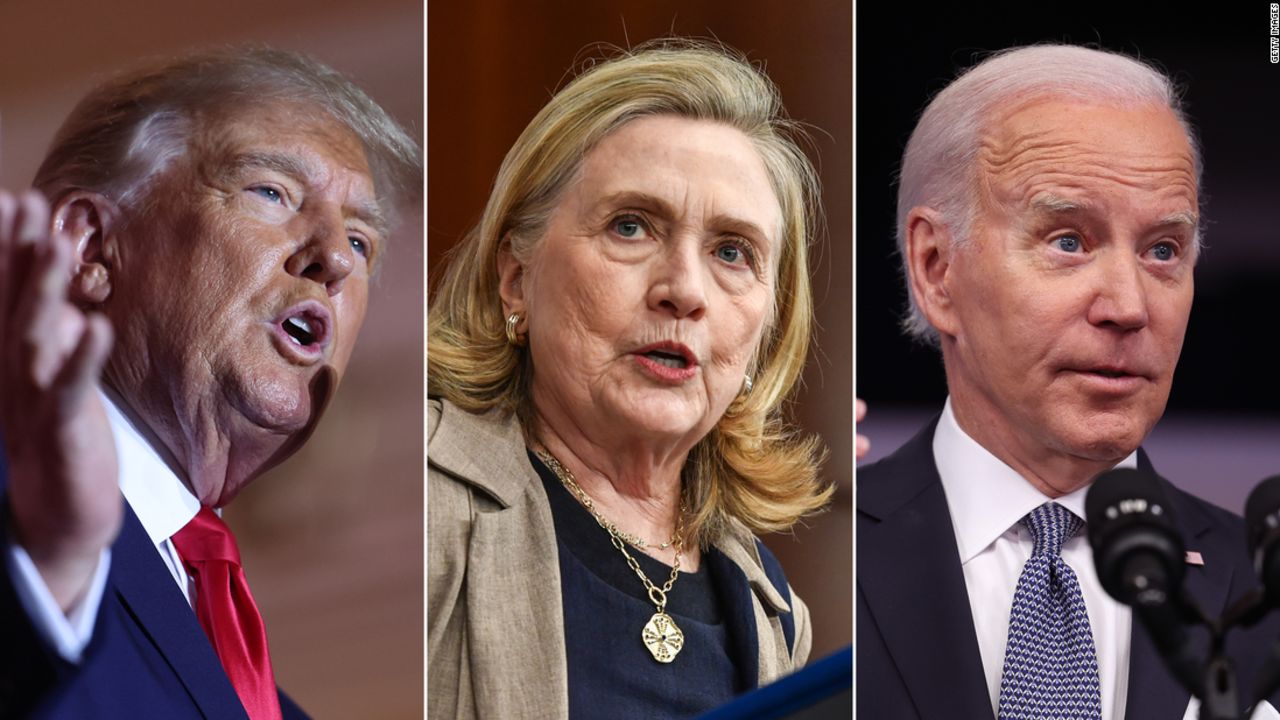Analysis: the investigation into classified documents at Biden's home 4:51
(CNN) --
This is getting absurd.
Americans have had a choice of three people to be president since 2016, and in all three cases they have been found to have classified documents in their possession that they shouldn't have.
What is the importance of a special prosecutor investigating the discovery of classified documents in a private office and in the house of Joe Biden?
Clearly, there is a bigger problem.
Here's what we don't know:
We the citizens do not know what documents President Joe Biden had locked up in his garage or in his office folder at the Penn Biden Center.
We don't know specifically what documents the FBI photographed at former President Donald Trump's Mar a Lago compound.
Donald Trump, Hillary Clinton and Joe Biden.
We don't even know for sure what documents were on Hillary Clinton's email server, though we do know that dozens of those documents were retroactively classified years after the fact, long after the existence of her private email server became in a political issue.
This is what we do know:
The classified documents, and their appearance in emails, offices, a storage room and a garage, have created huge political problems for successive presidential candidates from both parties.
advertising
The classification system used by the US government is divided into separate organizations, is impossible to follow, and is not applied uniformly.
On Sunday I tried unsuccessfully to find a written estimate of how much classified information the US government produces each year.
A fascinating Twitter thread from former CIA attorney Brian Greer explains that most information classified by the government is put under classification by default, as a "derivative classification decision."
Learn about the process for investigating Biden documents 5:54
He links to a 2016 estimate from the Office of Information Security Oversight at the National Archives which estimates that in that year alone there were more than 102 million pages of US government documents reviewed for declassification and about 44 millions of pages were declassified.
That means the government didn't declassify most of the documents it could that year.
Thousands of rulebooks
A more recent report from the same agency notes that there are 2,116 different "security classification guides" according to which different government agencies classify documents.
The National Archives says they should be evaluated and streamlined in a comprehensive way that continues to take into account the differing needs of the 18 US intelligence agencies.
More than a million people have high-level clearance
As I already pointed out in August, it is actually a very broad universe of people with access to data considered top secret.
The director of national intelligence publishes what is described as an annual report, the "Security Clearance Determinations," although the most recent I've been able to find is from 2017. It describes more than 2.8 million people with clearances. security in October 2017: more than 1.6 million have access to confidential or secret information and almost 1.2 million have access to top secret information
Biden talks about the documents found in his office 0:40
There are more people who have a security clearance but don't currently have access to the information.
This includes civilian employees, contractors, and members of the military.
When is it ranked higher?
There are many examples of information that was kept classified by the government long after it was needed.
For example, the documents related to the assassination of JFK, 60 years ago, which the CIA released last month.
Or, as The Washington Post points out in an editorial, the absurd fact that the interviews of President George W. Bush and Vice President Dick Cheney with the 9/11 commission were kept secret for 18 years.
The Post's editorial board outlines some recommendations, including perhaps deleting the lowest level of classification, "confidential."
You have to admit there is a problem
In June, prior to the revelations about Trump's improper or accidental retention of classified documents, the Biden White House launched a systemic review of the classification system.
This followed a petition from senators who complained that the ranking system costs taxpayers $18.5 billion a year, according to The Wall Street Journal.
The Wall Street Journal also reported on a letter that Director of National Intelligence Avril Haines sent to senators stating that excessive classification is a threat to national security.
The differences between Biden and Trump classified documents 3:39
"In my view, the shortcomings of the current classification system undermine our national security, as well as fundamental democratic goals, by impeding our ability to share information in a timely manner," it said.
Soon after, the Biden administration demonstrated that information sharing can be beneficial, such as when his administration began releasing secret information to the world that Russia was planning to invade Ukraine.
No one is suggesting that there should be no classified information
The identities and methods of people who obtain intelligence information must be secret.
Details of nuclear capabilities and other equally sensitive materials should be kept secret.
But it's also important to recognize that senior government officials and the intelligence community agree that the government keeps too many secrets.
Donald Trump Joe Biden

